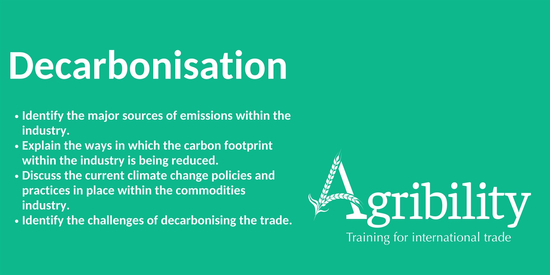Agribility - Decarbonisation
Decarbonisation
The agricultural commodity industry plays a significant role in global economies, providing food, feed and fuel for billions of people worldwide. The agricultural sector is a significant contributor to global emissions due to various activities like deforestation, livestock farming, fertiliser use, and transportation. Decarbonisation in this context refers to the process of reducing or eliminating carbon emissions associated with the production, processing, and distribution of agricultural commodities and is a critical aspect of addressing climate change and reducing greenhouse gas emissions. The potential for decarbonisation within the agricultural commodity industry is currently a topic being grappled with globally. Projects examining current emissions sources, technological advancements, policy frameworks are being implemented to address the issue.
By the end of this module, the learner should be able to:
- Identify the major sources of emissions within the industry.
- Explain the ways in which the carbon footprint within the industry is being reduced.
- Discuss the current climate change policies and practices in place within the commodities industry.
- Identify the challenges of decarbonising the trade.


